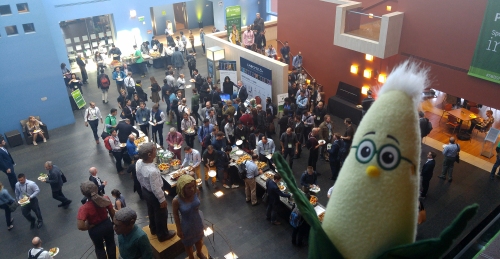
Next week, the SynBioBeta conference for 2018 will commence. This is a synthetic biology conference that brings business entrepreneurs, scientists, programmers and more from around the world to the San Fransisco bay area each year to give presentations, network, and keep up-to-speed on the latest developments in their field. I’ve been to many academic and industry conferences, from the BIO Convention to MOSES Organic, but this one struck me as very unique. Last year, I was invited to attend with complimentary registration, and took that opportunity to interview Neale Carter from Okanagan Specialty Fruits about the latest updates with Arctic Apples (public version / members version). Here I’d like to reflect on how different this conference was from others I’ve been to.
Every academic and business community has its own unique character, culture, and goals. Academic conferences are known to be casual to semiformal – some more than others. My first conference ever was Maize Genetics 2008 in Washington DC, and the organizers put together a presentation with members of Congress at the Smithsonian and had to send an email saying yes you heard us – we said bring a formal outfit with nice shoes – and we mean necktie-formal! I gathered that some professors grumbled about dressing up fancy – even if it was to thank senators for funding the maize genome sequencing project. In academia it’s about the science more than the appearance, whereas industry conferences seem to have more uniform attire.
At Biotechnology Industry Organization (BIO) conventions, suits and ties are the rule, not the exception. A sea of penguins in huge concrete convention centers talking about research, policies, investment, supply chains, products, and more. On the flipside, MOSES Organic has gone to plaid, even announcing to their attendees to “pack your plaid” as they go to La Crosse, Wisconsin at ludicrous speed. These divisions of uniforms reflect their community cultures – the suits speak to business acumen and success as they discuss intellectual property and try to attract investors, and the plaid flannel straddles farming to marketable imagery as they do practical workshops on weed control and upselling their heirloom tomatoes. (I’ll admit that I feel out of place at both with the brightly-colored shirts I’m known for – but hey at least Frank N. Foode has fans in both worlds.)

One of the first things I noticed about SynBioBeta was that it didn’t quite fit into any of these models. There were some suits, but they tended to have shirts unbuttoned with no ties. There was casual and business casual, and yes, there was also plaid – but plaid worn for its hipster irony rather than for a salt-of-the-earth image. Fitting with an expanding and exploratory field, the range of raiment had more of an academic feel, and that trend came through in the talks and networking. But you’re still not going to get me to wear plaid.

I only attended for one day, but the range of topics was diverse. One moment I was learning about RNA-based medicines being developed, the next moment it was turning feedstock into polymers in bioreactors. The San Francisco-based confab got to hear about Arctic Apples, and Taxa was there displaying their mildly-scented biotech moss (the glowing plant currently shelved), but plants were only one part of the whole affair. Whatever the organism, in synthetic biology the tools and methods used to do research and develop products are as universal as DNA code, so cross-talk across traditional domains is common.
During one of the breaks, I mingled and talked to a few people around me. One was a programmer who designed custom monitoring and control systems for bioreactors so you could keep tabs on your experiments and control them from home if you wanted to. The conference also took a new approach to networking that I had not seen before. Many conferences have turned to custom apps to help people pick their favorite sessions, posters, and find their way around the conference center. SynBioBeta’s app allowed you to search the conference attendees and send them messages to see if they wanted to meet you. Before too long, I sat down to talk to a bay-area entrepreneur who was synthesizing fibers for making fabric – and naturally I want to know if I could make a shirt from it. Later, a researcher who coordinates research on the International Space Station contacted me about something they thought might be up my alley. I haven’t seen this kind of updated networking anywhere else but at a conference by and for bio-techies.

I was glad to be able to attend, but like many industry conferences it is expensive. At about $2,000 a pop, the bar is high for students and others who are just starting out. Higher even than BIO, they should take a page from academic conferences like Maize Genetics and get their sponsors to foot the bill to prioritize the attendance of students and those who are early in their careers. Those students, inspired by what they will learn, will return as future sponsors when their ventures are successful.
The synthetic biology community was upbeat, friendly, and approachable, and I would go again if I could. I will not be able to attend this year, however I guess you could say I’ll be there on film: Food Evolution (see my review here) will be tabling at this year’s SynBioBeta! You can find them at table 117.
Thanks to John Cumbers for inviting me to attend, who I ran into at the first March for Science in San Francisco!
- Comment
- Reblog
-
Subscribe
Subscribed
Already have a WordPress.com account? Log in now.